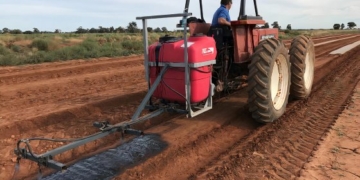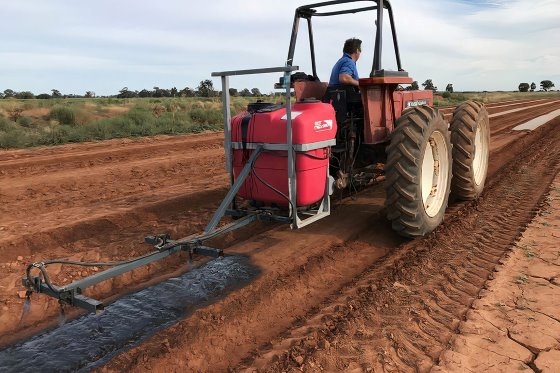Australian Research Organisation CSIRO has developed a sprayable biodegradable polymer mulch that can help farmers produce more, while using less water, nutrients and agrochemicals.
The new technology, named TranspiratiONal, is an environmentally-friendly alternative for agricultural plastics, such as polyethylene, often called plastic mulch. Trials have confirmed increases in crop water productivity in excess of 30 per cent, while also assisting to control weeds.
According to CSIRO there is a worldwide challenge to grow more food, using less resources. “The world’s population is growing, requiring food production to double by 2050 to feed an expected nine billion people. The need to expand our food production output is also impacting the environment through the use of fertilisers and other chemicals”, CSIRO says.
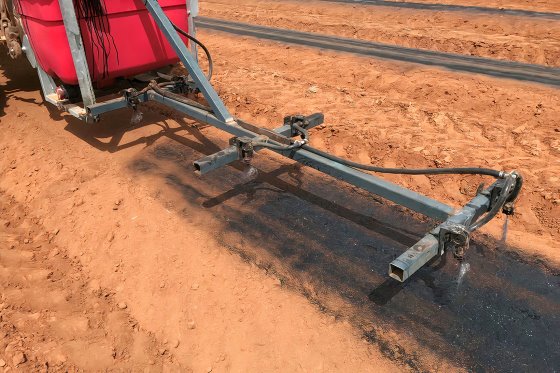
Polymer membrane
Researcher Dr Keith L. Bristow came up with the idea of a polymer membrane. “I had been doing a lot of work around the health of soils, and the interaction of water with the soil”, he says. “I went to China some time ago and was just horrified by the plastic mulch films they were using. We visited some fields where plastic was more dominant than the soil. This means the soil pores were mostly blocked and toxins were leaking into the soil and surrounding water systems.”
My view was that all farmers should be able to apply the membrane, even those in Africa using a simple hand sprayer
Dr Bristow set out to create a product that could replace the plastic mulch films. He wanted to produce a biodegradable product, that could be sprayed. “My view was that all farmers should be able to apply the membrane, even those in Africa using a simple hand sprayer or those in the US, using large mechanical machines”, he explains.
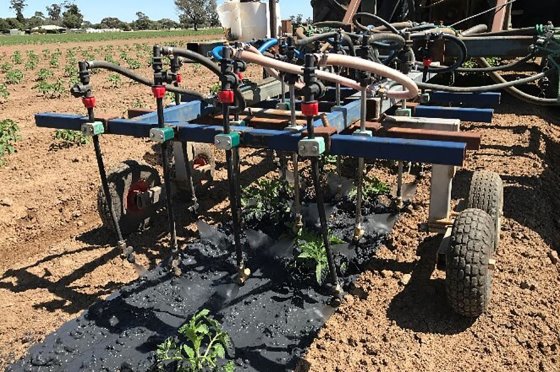
Field trials
After developing the membrane technology, CSIRO conducted several experiments and field trials in Australia. “We used big and small farm equipment and proved that our polymer membrane can be accessible to small scale farmers in developing countries and large scale highly mechanised farmers and agribusinesses in developed countries”, Dr Bristow says.
CSIRO demonstrated the sprayable technology in irrigated field plot trials in Australia using melons, tomatoes, sorghum and cotton. The trials confirmed increases in crop water productivity in excess of 30 per cent, while also assisting to control weeds.
“We‘ve got our proof of concept but we need to further finetune the polymer spray”, Dr Bristow says. “We want to make it as durable and cost effective as possible. At the moment the cost is probably higher than the plastic mulch film that is widely used.”
Release of toxins
Farmers have told Dr Bristow and his team that they would no longer use plastic mulch film if they could use a cost effective sprayable biodegradable polymer membrane. “By using a sprayable biodegradable membrane they don’t have to retrieve a deteriorating plastic mulch film during and after harvest”, Dr Bristow says. “And a lot of the plastic mulch film is still causing problems. It gets burned, which the government and community don’t like, or it goes to a waste facility. And when it breaks down into smaller fragments it releases toxins into the soil and our water systems, including, streams, rivers and groundwater below.”
The farmers in the trials were in general happy with the ability of the polymer membrane to cover the soil. Weeds were controlled and water was saved, resulting in more production. “Our aim is to maximise the transpiration and minimise the soil evaporation”, Dr Bristow emphasises.
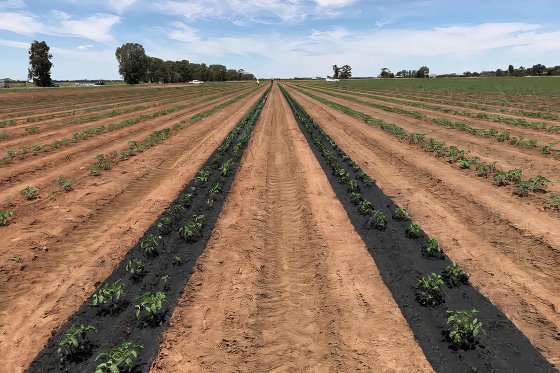
Biodegradable
The field trials have showed a number of advantages of the polymer membrane of CSIRO over the plastic mulch films that farmers are currently using. The polymer membrane is biodegradable, and most plastic mulch films are not. This new product is sprayable. Farmers can use existing farming equipment for the application – with minor, low cost modification. The application of plastic mulch films is expensive as it requires specialist farming equipment.
Plastic mulch films can cause extreme surface temperatures. The application of the polymer membrane however moderates the soil surface temperatures. The trials showed that plastic mulch films caused seedling damage and death of plants. The use of the polymer membrane caused minimal to no damage to seedlings.
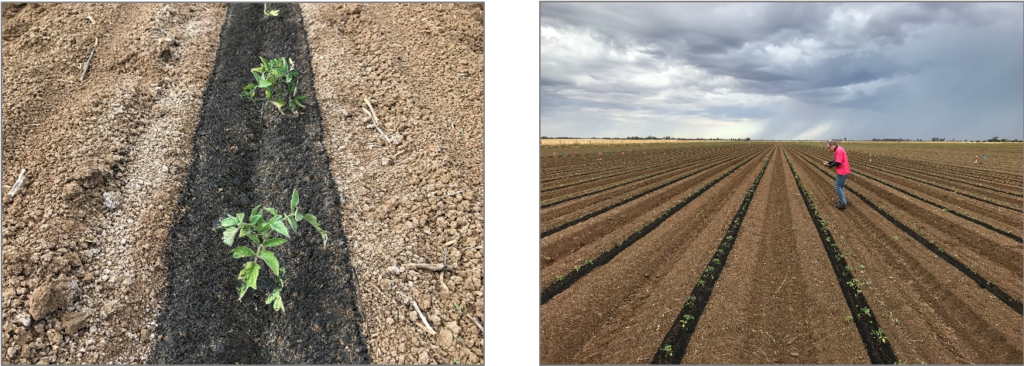
Polymer membrane safe to use
Dr Bristow and his team have made sure that the polymer membrane is safe to use. “We took samples of the soil with the polymer and of the products, for example the skin of melons”, he says. “We probably did a couple of hundred different tests. The results proved that there was nothing untoward or toxic in the product and that it is biodegradable. Farmers can just leave in the field after harvest.”
Dr Bristow would prefer to do some pre‐commercial farm trials to finetune the polymer formulation, its application and impact. He is currently talking with investors to finish the preparations for the pre-commercial trials. There is enough interest among farmers. “I get contacted every week by farmers, sometimes six times a week. People are calling me from across the world.”
Free up more than 1,000 gigalitres of water
CSIRO explains that achieving the initial target of using 10 per cent less water with no yield loss in Australian irrigated agriculture would free up more than 1,000 gigalitres of water. “This could be used for growing additional crops and/or improving environmental flows in our waterways”, CSIRO says.
